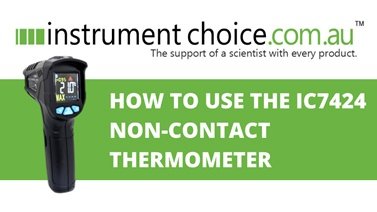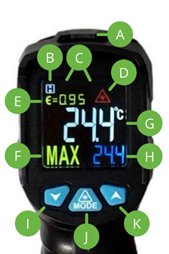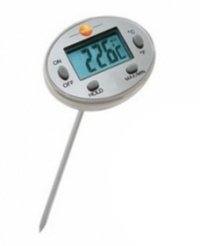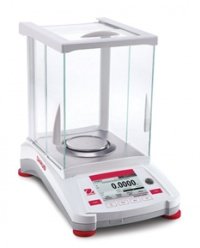How to Use the IC7424 Non-Contact Thermometer

Non-Contact Thermometers offer an affordable, fast and easy way to measure the temperature of surfaces. The IC7424 offers an assortment of user-friendly functions and easy-to-adjust settings to suit all your measurement needs.
Figure 1 Watch an Instrument Choice Scientist demonstrate how to use the IC7424 Non-Contact Thermometer here.
How to Use the IC7424 Non-Contact Thermometer
Battery Installation
- Unclip and open the battery compartment.
- Install the two included AAA batteries.
- Clip the handle back into place.
- Depress the trigger will switch on the non-contact thermometer.
The Display
 |
|
How to Turn the Laser Pointer ON/OFF
- Press and release the MODE button.
- When the laser pointer is switched on, the small laser symbol will display. When the laser is switched off, the laser symbol will not be visible.
IC7424 Non-Contact Thermometer Device Settings
- To enter device settings, press and hold MODE for around 2 seconds.
- The first option is high alarm limit adjustment. HI appears in the top left corner and the current set value on the bottom right corner.
- Press the UP and DOWN arrows to adjust the high alarm limit.
- Press MODE to save your selection. The device will move onto the next screen.
- The low alarm limit value adjustment screen will appear. On this screen, LOW will be present on the top left and the current set value on the bottom right corner.
- Press the UP and DOWN arrows to adjust the low alarm limit.
- Press MODE to save your selection. The device will move onto the next screen.
- The next screen is emissivity value adjustment. By default, emissivity is 0.95, which is suitable for most items. To adjust the emissivity, use the UP and DOWN selector keys until your desired value is displayed.
- Press MODE to save your selection. The device will move onto the next screen.
- Temperature display adjustment. Use the UP and DOWN selector keys to adjust the temperature display between Celsius and Fahrenheit.
- Press MODE to confirm.
- After confirming this, the device will return to the start of the settings menu. If you are happy with all your selections, press the trigger to exit the settings menu
How to Take a Surface Temperature Measurement with the IC7424 Non-Contact Thermometer
- Point the thermometer at the surface to be measured.
- Press and release the trigger.
- The measured value will appear and remain on the LCD.
Conclusion
The IC7424 Non-Contact Thermometer is an easy to use and handy tool for accurately measuring the surface temperature of hot, hazardous and hard to reach places.
Need a hand with your IC7424 Non-Contact Thermometer? Or want more information about non-contact thermometers? See the links below or contact us!
Additional links
- View the Non-Contact Thermometer with 12 Dot Lasers for Target Area - IC7424
- Watch “How to Use the IC7424 Non-Contact Thermometer”
- Want to see what comes in the box? Watch an Instrument Choice Scientist “Unboxing the IC7424 Non-Contact Thermometer”.
- View all Non-Contact Thermometers here.
- Want more articles about Non-Contact Thermometers? Check out the Instrument Choice blog articles below:
- IR Non-Contact Thermometers; How to read specifications
- How do Infrared Non-Contact Thermometers work?
- 3 Common Misconceptions About Digital Infrared Non- Contact Thermometers
- How to Get the Best Results from your Digital Infrared Non-Contact Thermometer
- Get Cooking With the Best Non-Contact Thermometers for the Kitchen!
Also interesting
An inaccurate thermometer is as good as no thermometer at all. To ensure your kitchen thermometer is performing to its listed specifications, our scientists have documented a quick, low cost and effective way to check the accuracy of your thermometer using readily available items.
Get the best method to check whether your thermometer is working correctly

Three main types of digital balances are used for many similar scientific tasks, and selecting the right device for your application can be time-consuming. However, knowing the technical and practical differences between digital balance styles will simplify your task. For this reason, Instrument Choice Scientists have created an article that clearly defines and efficiently unpacks the key issues.
Read on for our scientists' exclusive guide to weighing balances

